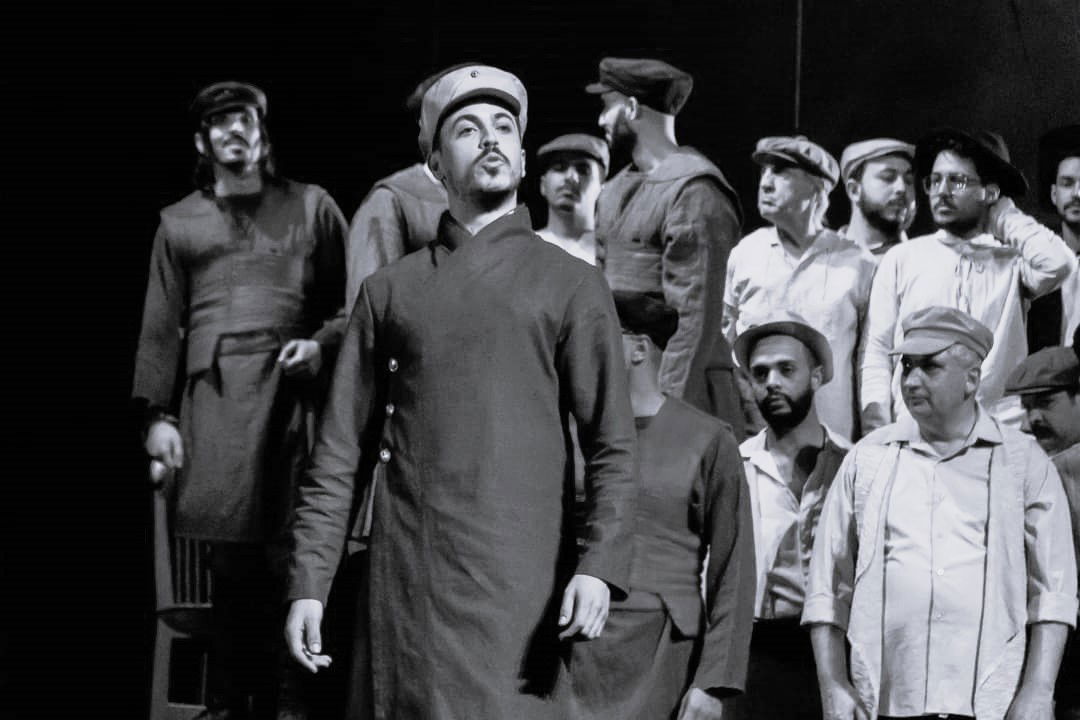Dhia Raies, artist without limits: "thanks to music I found my dimension in Tunisia"

This interview originally appeared on the Italian “Strumenti Politici”.
Until a few years ago he thought of leaving everything and emigrating to Europe, like many of his peers. But then in music he found his dimension in Tunisia. Growing up between Nabeul and the capital with his grandfather, he preferred singing school to a military career. He is Dhia Raies, in “Carmen”, Brigadier Moralès of the Dragoon Corps. “If I had been an army officer perhaps, I would have been like Moralès to pass the time by watching people as he has nothing to do. Morales laughs, flirts with the girls who pass by. It's his job. When his superior arrives, he begins to be serious and to give the image of a professional officer.” Dhia admits, smiling as he recalls the importance of Bizet's character in the opening of the opera "Carmen" staged at the Tunis Opera Theater on 14 and 15 February for the first time.
Dhia Raies does not hide the great emotion he felt in opening the Opera’s first act. In the great excitement of the square, a girl with a slightly lost look stands out. It is Micaela who has arrived from her native town in search of her fiancé, Brigadier Don José, coming to Seville to pursue a military career. She asks around for news of her lover, but only Brigadier Moralès can give her an answer: Don José will arrive shortly, he is not there but they are waiting for him. Dhia Raies is studying in the second year of a master's degree in Music and interpretation, specializing in opera singing, member of the Tunis Opera, baritone.
“Making music is the real challenge for me – he says – I started studying four years ago. I had no training during my childhood or youth. I just started playing at the Higher Institute of Music in Tunis. So now I'm focused on continuing my studies. Carmen, in addition to being performed for the first time in Tunis and the Maghreb, was also my first experience with an orchestra. As the first soloist to open the stage I was very excited, but it all worked very well in my opinion. I like being the protagonist on stage. I never wanted to go down, I could have continued and ended my life there."
He underlines how incentivizing Nicoletta Conti's role was for the success of the opera, severe and attentive to detail at the beginning, motivating and encouraging in the days of staging. “Nicoletta managed to encourage us, thanks to her we brought out the best in her. I simply sang in exams, or in small concerts, or with piano accompaniment. I also sang the Tunisian national anthem on several occasions, such as at the Italian Republic Day at the embassy and at the Egyptian embassy. The most formative experience was with El Sistema, of which I am a member, an integration association, which is based in Venezuela, Latin America, almost at the end of the world. In addition to opera, I perform traditional Tunisian and oriental music and I like to experiment with pop." “Carmen” marks, in his case too, a before and an after. “Before I appreciated Arabic singing more, oriental music, for its notes and lyrics full of meaning. Music, especially traditional music, is always strong and you can feel the energy. But with opera it's really something else, because the whole body express itself: movements, grimaces, gestures. Here I want to be everything. Not just the voice. The voice is epic, but there are many people who can sing, but few know how to convey energy or feeling. My ambition is to excite the public, to leave a mark on the world through art." Dhia Raies adds.
Regarding the future of artists in Tunisia and the Arab world, Dhia has a clear vision: “We must be united. The market is quite compressed, but we must face these difficulties together. If we want to get results, change people's mentality towards art, or rap will destroy us. Tunisian artists all have ambitions, we must work together as we did for the ‘Carmen’ to realize them. My family always supports me, although at the beginning, my parents preferred that I specialize in another sector and make music in parallel, as a hobby. But I chose to live off art, to focus on music and singing. Obviously, my family supports me in every decision, whatever it may be." In conclusion, he reiterates the social role of art as a means of integration and involvement. “I hope that Tunisia supports art as a means of social integration, through cultural and human projects, reaching even the most rural areas, because out there it is full of talents, of great voices and artists who are not even aware of their capacities. An enormous human capital that is just waiting to be valorized".